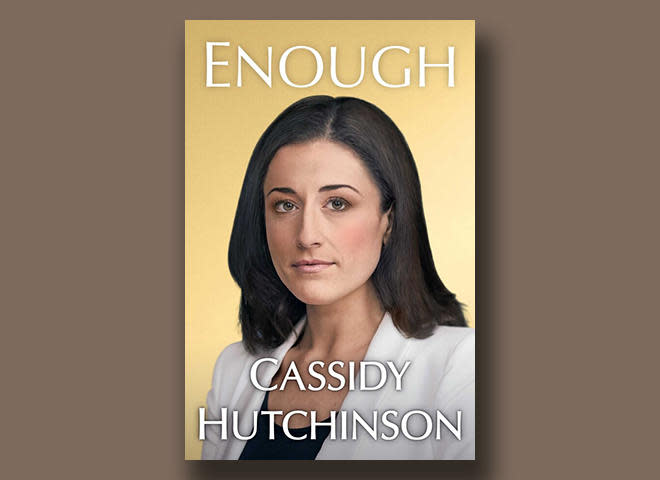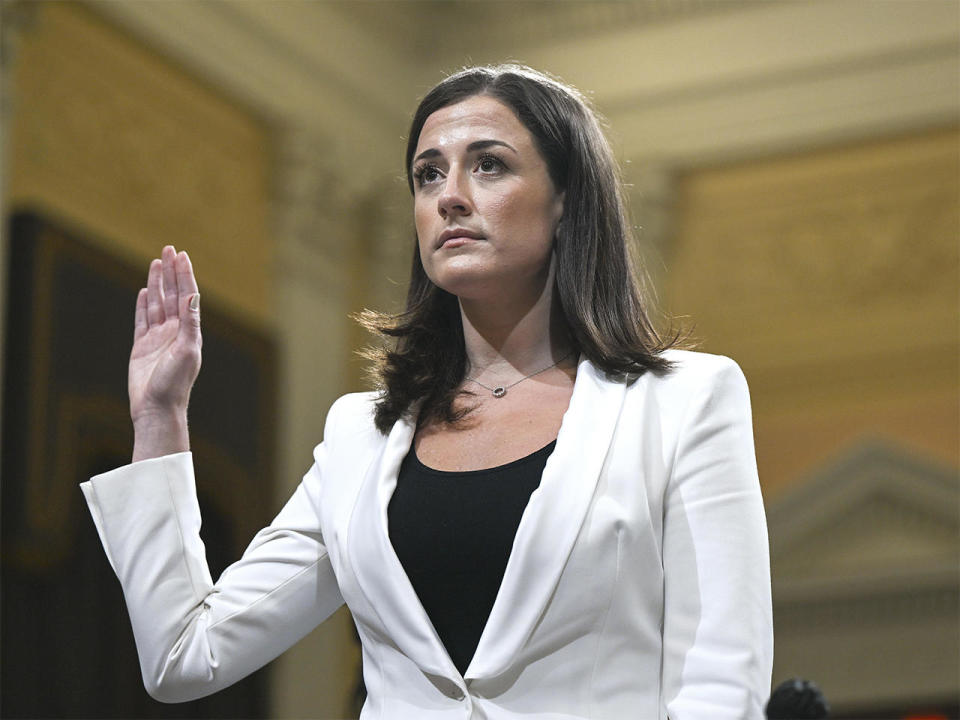Book excerpt: "Enough" by Cassidy Hutchinson

- Oops!Something went wrong.Please try again later.
- Oops!Something went wrong.Please try again later.
- Oops!Something went wrong.Please try again later.
- Oops!Something went wrong.Please try again later.
We may receive an affiliate commission from anything you buy from this article.
Cassidy Hutchinson was senior advisor to White House chief of staff Mark Meadows at the time of the Capitol Hill assault by Trump supporters attempting to halt the peaceful transfer of power. She would later offer powerful testimony to the January 6 Committee about the actions of former President Donald Trump that shocked even jaded Washington observers.
Hutchinson writes about her experience in "Enough" (to be published Tuesday by Simon & Schuster, a division of CBS' parent company, Paramount Global).
Read the excerpt below, and don't miss Tracy Smith's interview with Cassidy Hutchinson on "CBS News Sunday Morning" September 24!
"Enough" by Cassidy Hutchinson
Prefer to listen? Audible has a 30-day free trial available right now.
Prologue
How had I gotten here? What had I done to wind up in this predicament, a featured player in a Washington political scandal, struggling to keep my composure under the glare of television lights as I became, depending on your political allegiance, briefly famous or infamous?
The Cannon Caucus Room is one of the largest and grandest rooms in any of the House office buildings. With its high, ornate ceilings and chandeliers, it looks like a Hollywood set that's meant to transform the often cramped and dingy reality of government office space into a majestic hall of power. As Rep. Liz Cheney, of Wyoming, would observe in a subsequent hearing, it had been home to the historic talks for women to be able to vote a century earlier; Cheney noted, "In this room in 1918, the Committee on Woman Suffrage convened to discuss and debate whether women should be granted the right to vote." I would estimate its generous proportions could accommodate five hundred or more people comfortably.
On June 28, 2022, I entered from the back of the chamber with my lawyers, and we wound our way down a security-cleared path to the witness table, past a row of US Capitol Police officers. There wasn't an empty seat in sight. House staffers who couldn't find a seat stood along the walls. Photojournalists pressed against the table, clicking away. I blinked and tried to adjust my eyes to the bright lights needed by the many C-SPAN cameras that were providing the live feed to the news networks. I had wanted to arrive at the same time that the members of the committee did, so I wouldn't have to endure prolonged, awkward minutes of being frantically photographed as I tried not to return people's stares. But still the seconds ticked by excruciatingly slowly as I waited for the hearing to start.
The atmosphere was charged, to say the least. Everyone in the room—committee members, reporters, spectators—seemed attuned to the sense that something dramatic and important was about to happen. So was I, the hearing's sole witness. The committee had been methodical in planning its five previous hearings. Today's hearing had been rushed, out of concerns for my safety, news reports claimed, and, I expect, out of concern that I might back out at the last minute.
I just might have. I had been episodically panic-stricken for the last twenty-four hours. The night before, I had pleaded with my lawyers, Jody Hunt and Bill Jordan, that I wasn't ready and needed more time. I had threatened to bolt on the car ride to the hearing, and again as I peered from a holding room into the bright, bustling hearing room.
As members of the select committee looked down at me from the dais, I could sense myself trembling, and I worried someone would notice. I could feel that my necklace wasn't straight, which Mom had warned me about, so I tried to straighten it discreetly, aware my every move could be scrutinized.

When the hearing concluded, press accounts described me as cool, calm, and collected. A Washington Post columnist wrote that I "had a preternatural poise." And in truth, once the hearing began, my nerves quickly settled as Liz Cheney, whom I had come to trust and admire, began to question me. But before the gavel came down and Liz began her inquiry, I had felt debilitated by my nervousness.
I was an ambitious twenty-five-year-old conservative Trump White House staffer, who had occupied a position in proximity to power. I had worked myself to near exhaustion to prove worthy of it. Now I was about to provide testimony in a high-stakes congressional hearing that I knew could damage, and potentially incriminate, the former president of the United States. I was also going to alienate friends and former colleagues.
How had I gotten here? Shortly before I graduated from college, with several congressional and White House internships on my résumé, I had shared my aspirations for the future with a reporter for a student newspaper. I wanted to "be an effective leader in the fight to secure the American dream for future generations," I volunteered, "so they too will have the bountiful opportunities and freedoms that make the United States great." Corny? Maybe. Presumptuous? Certainly. But I meant it, and I would work my tail off in service to that aspiration, to be useful to my country.
Before retaining my new lawyers, at times I had told less than the whole truth to a congressional committee charged with investigating a matter of the highest national importance, a matter that posed a threat to America's future greatness. I had withheld information about events that I had witnessed or that had been recounted to me by witnesses. Those events had precipitated the shocking assault on the United States Congress, an institution I cherish, and threatened the continued success of American democracy. My conscience was bothering me, and I came to the decision, in parliamentary language, to clarify and extend my testimony. That's the short answer. That's why I was there.
The long answer, the story of how I got there, is a little more complicated than that, and takes a little longer to tell.
From "Enough" by Cassidy Hutchinson. Copyright © 2023 by Cassidy Hutchinson. Reprinted by permission of Simon & Schuster, Inc. All rights reserved.
Get the book here:
"Enough" by Cassidy Hutchinson
Buy locally from Bookshop.org
For more info:
"Enough" by Cassidy Hutchinson (Simon & Schuster), in Hardcover, eBook and Audio formats, available September 26
Cassidy Hutchinson on being forced into hiding
Author Ken Follett discusses final book in "Kingsbridge" series

